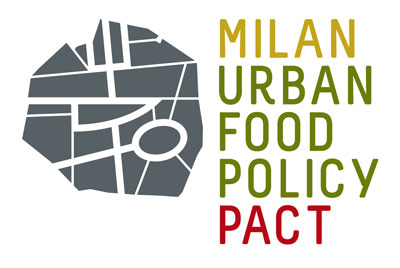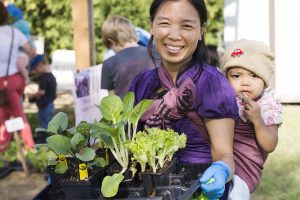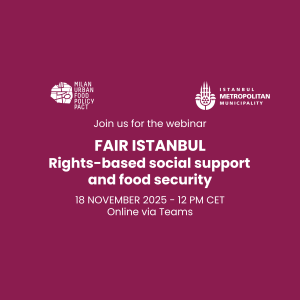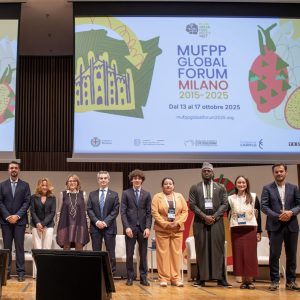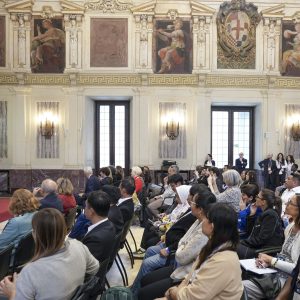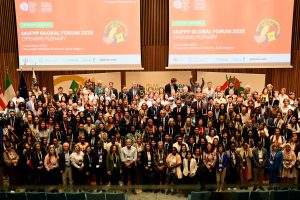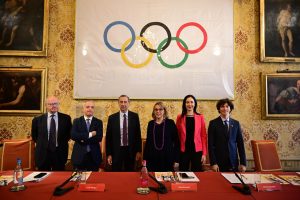Austin (United States), Seoul (South Korea), Medellin (Colombia), Jericho (Palestine), Ouagadougou (Burkina Faso) and Vantaa (Finland) are the winning cities of the Milan Pact Awards 2025: their projects stood out from over 340 food policy practices submitted for the 2025 edition

Launched in 2016 by the City of Milan and the Cariplo Foundation, with the support of the Italian Agency for Development Cooperation (AICS), the Milan Pact Awards aim to recognize the most innovative and ambitious practices in terms of sustainable food systems, promoting mayors’ action on urban food policies and fostering knowledge exchange between cities. Since 2016, 968 best practices have been collected, forming the world’s largest archive dedicated to urban food policies.
Following the 2022 edition held in Rio de Janeiro, where six cities were awarded and 18 received special mentions, the 2025 call for proposals invited signatory cities to submit up to three practices in the six categories of the MUFPP Framework for action: Governance, Sustainable Diets & Nutrition, Social & Economic Equity, Food Production, Food Supply & Distribution, and Food Waste.
The awards ceremony took place the 15th of October evening at the Piccolo Teatro Studio Melato in Milan, attended by Anna Scavuzzo, Vice Mayor of Milan in charge of Food Policy; Claudia Sorlini, Vice President of Cariplo Foundation; and Lanfranco Li Cauli, General Director of the Piccolo Teatro di Milano.
The nominations were evaluated by an international Evaluation Committee who selected this year’s winning cities:
—Austin for ‘Governance’,
—Seoul for ‘Sustainable Diets & Nutrition’,
—Medellin for ‘Social & Economic Equity‘,
—Jericho for the ‘Food Production‘,
—Ouagadougou for ‘Food Supply & Distribution’,
—Vantaa for ‘Food Waste’.
Special mentions also went to:
Copenhagen (Denmark), Grenoble (France), Jangseong (South Korea), and Kisumu (Kenya) – Governance category
Baltimore (United States), Berlin (Germany), Quezon City (Philippines), and Turin (Italy) – Sustainable Diets & Nutrition category
Bangkok (Thailand), La Paz (Bolivia), Nairobi (Kenya) and Nilufer (Türkiye) – Social & Economic Equity category
Belo Horizonte (Brazil), Chone (Ecuador), Nantes (France), and Sukabumi (Indonesia) – Food Productio category
Liège (Belgium), Mbale (Uganda), Paris (France), and Tandil (Argentina) – Food Supply & Distribution category
Bandung (Indonesia), Barcelona (Spain), Bogotá (Colombia) and Colombus (United States) – Food Waste Category
“The Milan Pact Awards are a key moment of the MUFPP Global Forum: an opportunity to discover the most innovative urban food practices of 2025. Since 2016, we have gathered, together with Fondazione Cariplo, countless experiences from cities around the world, building a unique knowledge platform, a true archive of food policy and development,” said Vice Mayor of Milan in charge of Food Policy Anna Scavuzzo. “We were impressed by the enthusiastic response from the MUFPP cities and their willingness to participate in this edition: a demonstration of the importance of food policy on the mayors’ political agenda and a confirmation of the signatory cities’ desire to continue this journey together to share knowledge on food policy and to envision increasingly innovative actions.”
For this edition, in particular, 347 submissions were received from 173 cities: the Food Production category was the most popular, with 70 submissions submitted this year, followed by Sustainable Diets & Nutrition with 64 proposals. In terms of geographical distribution, Africa, Asia Pacific, and South America made significant contributions: Asia Pacific increased from 18 submissions in 2022 to 52, Africa from 36 to 50, and South America from 37 to 58.






The projects of the winning cities and the reasons
Austin, Governance category
“For funding a comprehensive, participatory roadmap for a resilient and equitable local food system—in response to persistent inequities in food access and climate challenges—centering community voices, aligning policies across jurisdictions, and creating concrete steps to improve food access, support local farms, reduce food waste, and promote economic opportunity.”

Seoul, Sustainable Diets & Nutrition category
“For providing quality meals to over 150,000 children under 6 at small childcare centers, often overlooked by regulations and with limited resources, demonstrating enormous social impact through training for chefs, staff, and parents, and offering tailored services for children in vulnerable situations.”

Medellin, Social & Economic Equity category
“For implementing a school meal program that ensures access to healthy nutrition for over 232,000 students in urban and rural areas, prioritizing vulnerable children, adolescents, indigenous peoples, migrants, and people with disabilities, and for distributing 12,000 tons of food through a large-scale operation aimed at integrating environmental sustainability into operational efficiency to address high water consumption and waste.”

Jericho, Food Production category
“For building, in an arid and challenging environment, a facility that promotes resource independence by enabling the large-scale, high-quality reuse of treated municipal wastewater in agriculture, providing 3.500 cubic meters of water per day to hundreds of local farmers.”

Ouagadougou, Food Supply & Distribution category
“For comprehensive and replicable work in strengthening local market infrastructure through structural improvements, merchant training, urban-rural linkages, and the inclusion of local restaurants, with the goal of expanding the initiative to 50 markets across the city.”

Vantaa, Food Waste Reduction category
“For developing an integrated urban ecosystem for the recovery and redistribution of surplus food, including innovative pilot projects for food waste collection from canteens and catering services, and connecting dozens of NGOs, schools, and businesses through an efficient cold chain and a digital coordination platform, ensuring safe redistribution, conversion into biogas, and composting of organic waste. This has resulted in a holistic model that combines food security, circularity, and energy efficiency into a single, coherent strategy, transforming food waste into a social, environmental, and economic resource.”

Each winning city will now decide how to use the monetary prize: it can choose to improve or expand its initiative, or participate in a bilateral exchange, transferring its skills to another city or learning new practices from another MUFPP signatory in the spirit of sharing good practices among the network cities.
In particular, Jericho announced that they will donate the monetary prize money to food aid for children in Gaza.
All the winning practices of the Milan Pact Awards 2025, the Special Mentions and the main trends that emerged from the practices transmitted by the cities, will be available soon in the Milan Pact Awards 2025 report.

